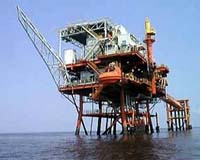 |
Algiers, Algeria (UPI) Aug 21, 2009 The plan to build the 2,500-mile Trans-Sahara Gas Pipeline to feed Europe runs the risk of being sabotaged by the threat of terrorist attacks along its route from Nigeria through Niger to Algeria, all danger-zone countries. These are among the least secure regions of the world because all are grappling with insurgencies, including al-Qaida. "Even a small-scale attack could seriously impair or delay the completion of the pipeline, dramatically raising costs for the companies involved," according to a recent analysis by the Washington-based Jamestown Foundation, a think-tank that monitors global security issues. The $13 billion pipeline is one of Africa's most ambitious infrastructure projects, but the Jamestown Foundation notes that "the risk of terrorism could seriously undermine the profitability of this enterprise, raising costs beyond current expectations." The security concerns center primarily on the Movement for the Emancipation of the Niger Delta, which has been waging an armed struggle against the oil industry in southern Nigeria since December 2005, and on Algeria, where al-Qaida in the Islamic Maghreb is active. The jihadist group has attacked foreign interests in recent years, including oil workers, and its southern arm operates deep in the Sahara where the pipeline is projected to run. In Niger, there were major uprisings by Tuareg tribal militants throughout the 1990s that flared again in 2007-09. The latest conflict ended with a cease-fire in May following a split within the rebel organization, the Nigerien Movement for Justice. Talks are under way for a more permanent agreement, but security analysts advise that the danger of a further uprising cannot be discounted and that the pipeline would be a target, just as Niger's uranium industry was in earlier upheavals. According to U.S. security officials who monitor African developments, al-Qaida is also pushing into sub-Saharan African states, such as Niger, Mauritania, Chad and Mali, from its main operation bases in Algeria. Mend has already threatened to attack the pipeline if the project goes ahead. "Any money put into the project will go down the drain," the movement warned in a communique issued days after the governments of Nigeria, Niger and Algeria signed an agreement to go ahead with the project. Nigeria's military, one of the most powerful in sub-Saharan Africa, has sought to play down the MEND threats. Yet its 62,000-strong army, backed up by an 80,000-strong paramilitary force, has not been able to put down the militants, not to mention criminal gangs stealing oil by the tankerful, since MEND began its campaign six years ago. Still, the military spokesman, Col. Rob Abubakr, insisted that Nigeria's security forces would be able to protect the 650 miles of pipeline that will run through Nigeria, as well as gas installations and pipeline workers. "Such reassurances may not be enough for international oil companies, especially since MEND-led sabotage operations -- as well as kidnappings of oil company employees -- has led to a significant drop in Nigeria's oil production, which has fallen to 1.8 million barrels per day this year from 2.6 million in 2008," according to Eric Watkins, diplomacy editor of Oil & Gas Journal. Algeria's security forces, veterans of an eight-year civil war with Islamist militants through the 1990s, have a better track record in combating AQIM than Nigeria's military has against MEND. But IHS Global Insight, a London-based economic and financial consultancy, cautions that the 2,000-mile stretch of pipeline that will traverse sparsely populated Niger and the desert wastes of Algeria will pose "an immense challenge." Most analysts agree that the weak spot is Niger, partly because of its vast terrain, but primarily because its security forces are poorly equipped and trained, and its national security infrastructure is woefully inadequate to protect the 650 miles of pipeline that will run across its territory. Niger, Global Insight observes, "would find it hard to muster the intelligence and deployment capabilities required to deter and monitor potential threats." Despite these difficulties, the pipeline project, scheduled to be operational by 2015, has gained considerable traction following another mid-winter gas supply crisis in Europe caused by a dispute between Russia and Ukraine. The pipeline offers one of a few possible alternatives for gas-dependent Europe to significantly reduce its reliance on Russian gas. Europe gets 30 percent of its gas from Russia. Political tensions have forced the Europeans to look for some salvation to the south, where Algeria's state-owned oil and gas company, Sonatrach, is fast becoming a major provider of continental hydrocarbons. Share This Article With Planet Earth
Related Links Powering The World in the 21st Century at Energy-Daily.com
 Exxon Mobil evacuates offshore rig in Hurricane Bill's path
Exxon Mobil evacuates offshore rig in Hurricane Bill's pathOttawa (AFP) Aug 21, 2009 Exxon Mobil is evacuating all 200 workers from its Sable gas platform off the Canadian east coast, ahead of Hurricane Bill's expected arrival on the weekend, a spokeswoman said Friday. "We're closely monitoring the progress of Hurricane Bill. Based on the current predictions of its severity and with the safety of our workforce as a priority Exxon Mobil has decided to evacuate all personnel ... read more |
|
| The content herein, unless otherwise known to be public domain, are Copyright 1995-2009 - SpaceDaily. AFP and UPI Wire Stories are copyright Agence France-Presse and United Press International. ESA Portal Reports are copyright European Space Agency. All NASA sourced material is public domain. Additional copyrights may apply in whole or part to other bona fide parties. Advertising does not imply endorsement,agreement or approval of any opinions, statements or information provided by SpaceDaily on any Web page published or hosted by SpaceDaily. Privacy Statement |